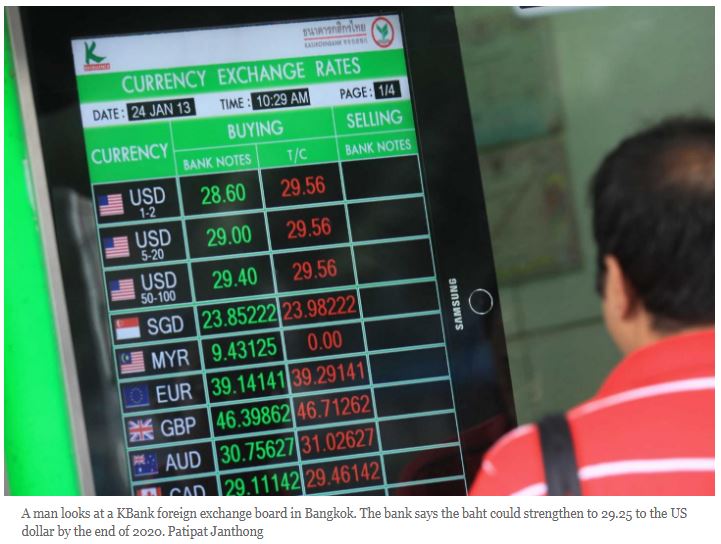Thailand: KBank predicts baht climb against dollar
Kasikornbank (KBank) sees the baht rising to 29.25 against the US dollar at the end of 2020, pointing to the US’s structural problems and external uncertainties.
The baht is expected to march past 30 to 29.75 versus the dollar in the first half of next year, up from 30.50 predicted at the end of this year, before strengthening further to 29.25 at the end of 2020, said Kobsidthi Silpachai, head of capital markets research at KBank.
Trade tensions between the US and China, the US presidential election, Federal Reserve rate cuts and Brexit are key factors pressuring the dollar worldwide, he said.
The trade war is expected to continue and could intensify as the presidential election approaches.
The baht is the best-performing currency in Asia, up about 7% against the dollar this year, as investors perceive it as a safe haven during the global economic slowdown.
Mr Kobsidthi forecasts the US central bank to cut its policy rate twice — once in the first half of next year and again in the third quarter — thus weakening the dollar relative to the baht.
Thailand’s economic imbalances will further strengthen the baht against the greenback, he said, and the current account should continue to have a surplus of US$30 billion next year.
Although Fed rate cuts are expected to continue, Mr Kobsidthi ruled out the possibility of further rate reductions in Thailand next year, given limited policy space.
KBank has a downbeat view of GDP growth next year, expecting a decline to 2.7% in 2020 from 2.8% this year.
“The economy’s technical recession loomed over the third quarter,” Mr Kobsidthi said. “Without seasonal adjustments, the GDP growth rate for the third quarter would have contracted on a quarterly basis.”
Regarding the country’s structural economic problems, fiscal policy is a better tool to support the country’s economic momentum and manage the foreign exchange rate than monetary policy, he said.
The efficiency of monetary policy is typically seen during a vicious economic cycle, so the central bank’s recent measures have had little benefit for the baht.
Both external factors and the Bank of Thailand’s measures have resulted in significantly lower offshore fund inflows to short-term Thai bonds. Net inflows to short-dated Thai bonds have dipped to 50 billion baht, the lowest level since 2016, from 107 billion baht in July.
A narrower bond yield between long- and short-end notes contributes to lower foreign investment in Thai short-term bonds, Mr Kobsidthi said.
Source: https://www.bangkokpost.com/business/1803819/kbank-predicts-baht-climb-against-dollar


 English
English




